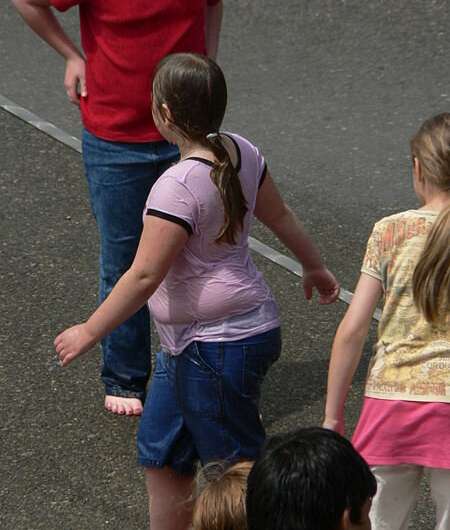July 16, 2019 report
Higher risk of pediatric multiple sclerosis in obese children, poorer response to treatments

A team of researchers with University Medical Center Göttingen, Georg August University Göttingen, has found that overweight and obese children are at higher risk of developing the relapsing form of multiple sclerosis (MS)—and they are also less receptive to medications meant to treat the disease. In their paper published in the Journal of the American Medical Association, the group describes their study of the medical records of 453 children diagnosed with MS before the age of 18 and what they learned.
MS is a demyelinating disease in which the insulating sheaths around nerves are damaged, preventing the nerves from working properly. Impacted areas can vary, as can symptoms. It is an incurable disease, but can be treated to reduce damage and symptoms. There are also two kinds of MS—relapsing and progressive. As the names suggest, those with the relapsing form go through periods when the disease is active and times when it is not. Those with the progressive form are much worse off—once it starts, it never stops. Symptoms and damage grow progressively worse. In this new effort, the researchers sought to gain a better perspective on the disease in children.
To learn more about which children are most at risk of developing the relapsing form of MS, the researchers studied the health records of 453 children in Germany's Center for MS in Childhood and Adolescence in Göttingen.
The researchers found that 13 percent of the children with MS were overweight (they had a body mass index in the 90th to 97th percentile) and 14.8 percent of them were obese (having a body mass index over the 97th percentile). This finding alone suggested that obesity in children puts them at greater risk of developing MS. The researchers also found that these children did not respond as well to medications and had higher relapse rates. And those who were the most obese had the worst relapse rates.
The researchers also looked at the results of MRI tests carried out on the children at diagnosis, during intervals and during a relapse. They report finding no evidence of a higher-than-normal active inflammatory response in children with a high BMI.
More information: Brenda Huppke et al. Association of Obesity With Multiple Sclerosis Risk and Response to First-line Disease Modifying Drugs in Children, JAMA Neurology (2019). DOI: 10.1001/jamaneurol.2019.1997
© 2019 Science X Network


















